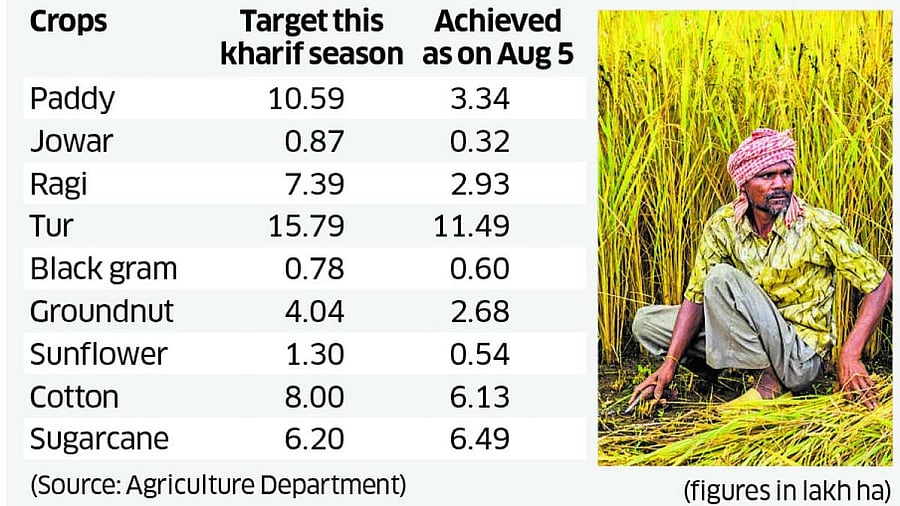
Credit: DH Graphic
The kitchen budget of state households is set to go for a toss as the prices of agricultural produce are expected to skyrocket following a decline in areas under cultivation due to poor rains.
While the agriculture department has set a target to cultivate 82.35 lakh hectares of land in the kharif season, the state has so far started cultivation activities only in 56.7 lakh ha (69%). Officials say Karnataka should have completed sowing activities by August-September.
There has been a delay in the sowing of several crops due to the late arrival of monsoon, and the windows to cultivate green gram and black gram are over.
The yield of several crops — tur dal, paddy, Bengal gram, horse gram and others — could be drastically lower compared to the last kharif season as standing crops could be infested with insects and disease, experts say.
"The next 15 days will be crucial as the scarcity of water due to poor rainfall could result in stunted growth of several crops that are now in the seedling stage," says BK Desai, research director, Raichur University of Agriculture Science, Raichur. He cites the example of tomatoes.
According to the data provided by the Director of Agriculture Department, the state had set a target of cultivating cereals such as paddy, jowar, ragi, maize, wheat and others on 35.36 lakh ha of land. However, as on August 5, it has achieved only 21.52 lakh ha. On average, Karnataka used to cultivate paddy on 4.22 lakh ha of land in the command area of the Kaveri and Tungabhadra rivers. However, this kharif season, sowing has taken place only on 3.34 lakh ha (The state had set a target of 10.59 lakh ha).
Take, for example, Mandya, one of the paddy and sugarcane cultivating areas of the state. "The district has witnessed 21% deficit rainfall this year. The rainfall has not been equally distributed either. As a result, only farmers on the banks of canals and with irrigation facilities are taking up paddy cultivation," says India Meteorological Department Subject Matter Specialist (agrometeorology) Arpitha SN. The Mandya-based expert says only 30-35% of farmers are taking up paddy cultivation in the region and predicts that sugarcane, which is to be harvested in January, will be affected as standing crops are not getting sufficient water.
Empty pulses bowl
The deficit rainfall in North Karnataka, a rainfed region, is set to push the prices of pulses further north. Compared to last two years, the tur cultivation area in the main tur-growing districts of Kalaburagi, Bidar and Koppal has shrunk substantially. In 2020-21, the state cultivated tur on 16.64 lakh ha of land and produced 12.38 lakh tonnes; in 2021-22, it was cultivated on 17.54 lakh ha that produced 11.45 lakh tonnes. However, this year, the state is estimated to cultivate tur on 12.45 lakh ha and produce 9.37 lakh tonnes.
"North Karnataka produces a variety of pulses and is considered the pulse bowl of India. However, the delay in the arrival of monsoon has pushed sowing of tur, Bengal gram, horse gram, cowpea and others by at least three weeks," says Desai. If the region does not get sufficient rains in the next 10-15 days, there is every chance that these crops either die or yield less, he adds.
He says low storage of water at reservoirs across the state is also a matter of concern as farmers may not get enough water to save standing crops.
Dr S Sridhar of the Centre for Resilient Agriculture, Keladi Shivappa Nayaka University of Agricultural and Horticultural Sciences, Shivamogga, said Karnataka is witnessing a "marriage of seasons", where the winter season is disappearing resulting in a short duration for crops to grow. "The erratic monsoon will result in crops being affected by insects and disease. This will result in lower yield," he says.
Low yield will certainly push food inflation, Desai says.
Agriculture Department Director GT Putra says that compared to last year, the cultivated land in the state has shrunk due to deficit rainfall. "There was a delay in sowing of certain crops. While the window for green gram and black gram is over, we are hopeful of other crops," he says.